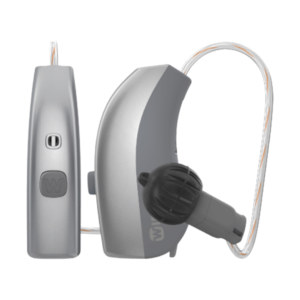Widex vs. Oticon: Hearing Aid Comparison 2023
Widex vs. Oticon: Hearing Aid Comparison 202...
Key Takeaways
- Widex and Oticon are two of the largest hearing aid manufacturers in the world.
- Both companies require you to purchase your hearing aids from a certified hearing provider. For those unsure about whether they have hearing loss, both Oticon and Widex offer online hearing tests.
- Both manufacturers provide devices suitable for people with mild to profound hearing loss.

Widex Hearing Aids
Widex is a hearing aid company that has been around for more than 60 years. The Denmark-based business was founded in 1956 and offers high-quality hearing aid devices suitable for mild to profound hearing loss.
At first glance, Widex’s selection of hearing aids may seem more limited than other hearing aid manufacturers. However, it is worth noting that the brand’s MOMENT and EVOKE hearing aids are available in several different styles and colors.
Available Widex styles include:
- In-the-ear (ITE)
- Behind-the-ear (BTE)
- Receiver-in-canal (RIC)
- Completely-in-canal (CIC)
The MOMENT and EVOKE models offer the following features:
- Rechargeable batteries
- Bluetooth-connectivity
- Water-resistant design
- Directional microphone
Keep in mind that features may slightly vary, depending on the style selected.
Widex also offers options for people with single-sided deafness. CROS-compatible hearing aids are for people with normal hearing in one ear and complete deafness in the other. The way this model works is that a microphone picks up sound from the deaf side and transmits it to the hearing ear. BiCROS hearing aid solutions are suitable for people with deafness in one ear and some hearing loss in the other.
Because the brand doesn’t sell directly to consumers, it doesn’t publish pricing information on its website. To give you an idea of the costs you can expect, the price starts around $2,500 and will vary depending on your provider.
Below is an overview of some of the technology used in Widex hearing aids.
- PureSound platform limits the time required to process sound
- ZeroDelay accelerator reduces sound processing times and improves sound quality
- My Sound artificial intelligence feature allows users to customize the hearing aids based on different activities
- TruAcoustics delivers high-quality sound
- Fluid Sound Analyzer automatically adjusts to background noise
- SoundSense Learn uses machine learning to keep sound profiles up to date
- Wind and noise reduction
The brand also offers remote care to users and allows for remote adjustments and customization.
Oticon Hearing Aids
Founded in 1904, Oticon has been around longer than Widex. Like Widex, the brand offers hearing solutions for people with mild to profound hearing loss.
The brand offers several hearing aid models and styles, including:
- RIC
- BTE
- Invisible-in-canal (IIC)
- CIC
- In-the-canal (ITC)
Keep in mind that features may vary slightly, depending on the model and style selected.
Like Widex, Oticon offers CROS options for people with single-sided deafness.
Because Oticon doesn’t sell directly to consumers, pricing information is limited, and you can’t buy directly from the company’s website. While exact pricing depends on your provider, Oticon hearing aids start around $1,000 per ear.
Oticon’s advanced sound processing platform, BrainHearing, is what sets the brand apart.
Comparing Features
| Cost | Widex | Varies according to provider | Oticon | Varies according to provider |
|---|
| Available online? | Widex | No, only available through a hearing provider | Oticon | No, only available through a hearing provider |
|---|
| Types of hearing loss | Widex | Mild to profound | Oticon | Mild to profound |
|---|
| Tinnitus masking | Widex | Yes, via a tinnitus management app called Widex Zen | Oticon | Yes, in hearing aids with SoundSupport™ |
|---|
| Bluetooth connectivity | Widex | Yes | Oticon | Yes |
|---|
| Smartphone app | Widex | Yes, TONELINK and MOMENT apps | Oticon | Yes, Oticon ON app |
|---|
| Styles offered | Widex | ITE, BTE, RIC, CIC | Oticon | RIC, BTE, IIC, CIC, ITC |
|---|
| Noise reduction | Widex | Yes | Oticon | Yes |
|---|
| Microphone type | Widex | Directional | Oticon | Directional |
|---|
| Batteries | Widex | Rechargeable and replaceable (battery type depends on the style) | Oticon | Rechargeable and replaceable (battery type depends on the style) |
|---|
| Water-resistant | Widex | Yes | Oticon | Yes |
|---|
| Telecoil | Widex | Yes | Oticon | Yes, except with CROS models |
|---|
Cost: Widex vs. Oticon

According to pricing information available on third-party sites like ZipHearing, Oticon and Widex offer devices at similar price points. However, a few of Oticon’s models cost slightly less than some Widex models.
Other Hearing Aid Brands We Recommend
If you prefer to buy your hearing aids directly from an online retailer or if you want to browse through different options, consider the following hearing aid brands:
- Jabra Enhance Select Hearing Aids (formerly Lively)
- Eargo Hearing Aids
- Phonak Hearing Aids
- MDHearingAid
- Lexie Hearing Aids
Summary
Widex and Oticon have been in business for many decades. These trusted hearing aid manufacturers offer high-quality hearing aids with advanced sound processing technology. Because they require in-person visits for purchase, it’s a good idea to speak with a hearing professional about your options. These experts can give you an overview of the different styles, models, and features that might be most useful.
Why You Can Trust Our Expert Review
Our experts research and recommend products that can help give you a better quality of life. Using our high standards and rigorous testing methodology, we’ve spent more than 4,000 hours, collectively, researching the best hearing aids to help you find the device that’s best for you. Throughout our research process, we did the following:
- Consulted with audiologists and geriatric care experts
- Mystery shopped the brands
- Surveyed hundreds of hearing aid users
- Tested various models of hearing aids
- Interviewed experts in the field
- Read thousands of verified customer reviews
Frequently Asked Questions
-
While the retail giant used to sell various hearing aid brands, Costco now exclusively sells its own Philips hearing aids and no longer carries other brands, including Oticon.
WRITTEN BY
Shannon Cuthrell is a North Carolina-based freelance journalist with a background covering business, technology and economic development. She has bylines in a variety of print and online news outlets, including Business North Carolina magazine, WRAL TechWire, NewsBreak and EE Power, among other publications. She graduated from Appalachian State University in 2016 with a bachelor’s degree in communication journalism and two minors in English and psychology.


